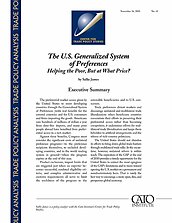The preferential market access given by the United States to most developing countries through the Generalized System of Preferences yields real benefits for the covered countries and for U.S. consumers and firms importing the goods. Americans save hundreds of millions of dollars a year from duty-free imports, and many poor people abroad have benefited from preferential access to a rich market.
Against these benefits, Congress must consider the significant costs of unilateral preference programs — to the preference recipients themselves, to excluded developing countries, and to the world trading system in general — when the program expires at the end of this year.
Product exclusions, import limits that are triggered just when an exporter becomes successful, outdated eligibility criteria, and complex administrative and customs requirements all serve to limit the usefulness of the program to the ostensible beneficiaries and to U.S. consumers. Trade preferences distort markets and discourage unilateral and multilateral trade liberalization: when beneficiary countries concentrate their efforts in preserving their preferential access rather than becoming competitive, it undermines efforts for multilateral trade liberalization and keeps them beholden to artificial arrangements and the whims of rich-country politicians.
The United States should not abandon its efforts to bring down global trade barriers through multilateral trade talks. In the meantime, however, unilateral reform is within reach. The expiration of the GSP at the end of 2010 provides a timely opportunity for the United States to correct the most egregious of the GSP’s limitations and to move toward opening the U.S. market on a permanent and nondiscriminatory basis. That is surely the best way to encourage a more open, free, and prosperous global economy..

This work is licensed under a Creative Commons Attribution-NonCommercial-ShareAlike 4.0 International License.

